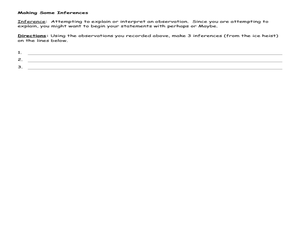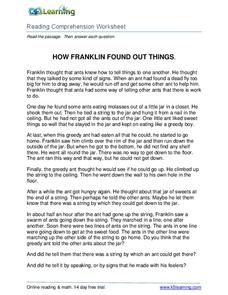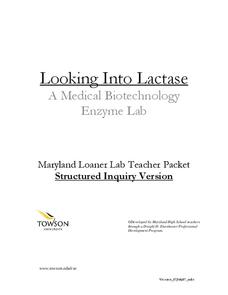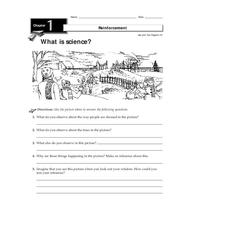Bethel School District
Observations and Inference
What's the difference between qualitative and quantitative observations? Learners make observations, inferences, and predictions about their environment with a set of questions and activities that are applicable to either language...
American Physiological Society
Did I Observe it or Infer it?
Take the mystery out of inquiry! When young scientists learn to use their keen powers of observation to make smart inferences about a situation, they are well on their way to understanding what the scientific method is all...
Curated OER
Observation and Inference
Assess your young scientists' understanding of the difference between observation and inference with this 20-question multiple choice quiz. It reviews a variety of physics and astronomy concepts, such as solar eclipses and sunspots, the...
UAF Geophysical Institute
Observing the Weather
How can you predict the weather without any technology? Young scientists learn to forecast the weather using traditional Native American techniques. Based on their observations of the weather, as well as talking to their classmates, they...
Cherry Creek Schools
Physical Science Final Exam Review Packet
If you need a way to assess the concepts in your physical science class, use an extended set of worksheets as a midterm or final exam. It includes questions about density, physical and chemical matter, speed and velocity, weight and...
Towson University
Mystery Tubes
How do scientists know they're right? Truth be told, they don't always know. Explore the scientific process using mystery tubes in an insightful activity. Young scientists discover how to approach and solve problems in science, how ideas...
It's About Time
Inferences of Waves
Building on the previous lesson, scholars use Slinkies to create standing waves. They graph waves on a calculator and then apply their knowledge to both sound and light waves. This is the fourth in a series of nine lessons.
Curated OER
Inferences: An Experiment with Ice
In this inferences: an experiment with ice instructional activity, students follow the procedure for the experiment with ice, then write inferences from their observations.
Curated OER
Process Skills Review: Observation, Inference, and Predictions
A simple instructional activity asks science learners to define five terms and identify five statements as predictions, observations, or inferences. This would be a supportive assignment when introducing elementary-levle scientist to...
Curated OER
Qualitative and Quantitative Observations
In this qualitative and quantitative observation worksheet, students determine if 10 given observations are quantitative or qualitative. They write a qualitative and quantitative statement and they write an observation and inference...
K5 Learning
How Franklin Found Out Things
Franklin learns about the world by making observations, and so do we! A short reading assignment prompts fourth graders to answer comprehension questions about a curious boy and what he notices.
Towson University
Looking Into Lactase: Structured Inquiry
Why is lactase important? Biology scholars explore enzyme function in a structured inquiry lab. The activity tasks lab groups with observing how temperature and pH affect enzyme activity, as well as determining which milk products...
Towson University
The Wildlife Forensics Lab
Can science put an end to the poaching of endangered species? Show your young forensic experts how biotechnology can help save wildlife through an exciting electrophoresis lab. Grouped pupils analyze shark DNA to determine if it came...
Curated OER
What is Science?
In this scientific observations worksheet, students study an illustration and then complete 5 short answer questions about what they observe happening in the picture.
Curated OER
Pop Rock Chemistry
In this pop rock chemistry worksheet, students suck on pop rocks, they mix open pop rocks with water and they observe them on a paper towel with water. Students write down as many observations as they can and they write down as many...
Curated OER
The Milk Bottle Quiz
In this scientific statements worksheet, students identify statements as an observation, inference, question, prediction, or factual. This worksheet has 7 matching questions.
University of Georgia
Energy Content of Foods
Why do athletes load up on carbohydrates the evening before a competition? The lesson helps answer this question as it relates the type of food to the amount of energy it contains. After a discussion, scholars perform an experiment...
Curated OER
Egg In a Bottle
For this scientific investigation worksheet, middle schoolers observe a demonstration where paper is ignited and placed in a bottle with a hard-boiled egg at the opening. Students predict what will occur, they make observations and they...
Towson University
Looking Into Lactase: Guided Inquiry
Milk does a body good ... unless, of course, someone is lactose intolerant. Pupils play the role of pharmaceutical scientists in a guided inquiry lab about lactase. Lab groups collaborate to learn more about lactose intolerance, how...
Curated OER
The Scientific Method
In this scientific method worksheet, students complete a crossword puzzle given 21 clues about the steps of the scientific method. Topics include observations, hypotheses, variables, inferences, results and conclusions.
Towson University
Case of the Crown Jewels
Can your biology class crack the Case of the Crown Jewels? Junior forensics experts try their hands at DNA restriction analysis in an exciting lab activity. The lesson introduces the concept of restriction analysis, teaches pipetting and...
Towson University
Looking Backwards, Looking Forward
How do scientists know what Earth's climate was like millions of years ago? Young environmental scholars discover how researchers used proxy data to determine the conditions present before written record. Grouped pupils gain experience...
Have Fun Teaching
Growing Seeds (9)
A seed, water, and sunlight. A seed, water, but no sunlight. A seed, sunlight, but no water. Young biologists are ask to infer what will happen to seeds given five different growing conditions.
Royal Society of Chemistry
Mass Changes in Chemical Reactions—Microscale Chemistry
What better way is there to introduce conservation of mass than a few simple experiments? Young chemists conduct two chemical reactions, take the masses of reactants and products, then compare their results to determine...

























